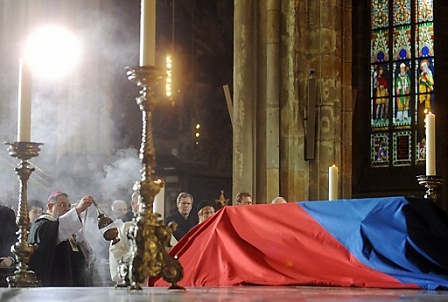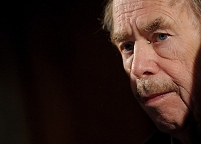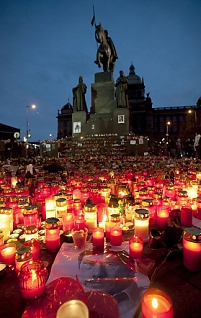Erstellt am: 23. 12. 2011 - 13:55 Uhr
The Difficulty of "Living in Truth"
I wonder how many of the young people gathering in recent weeks on the streets of Cairo or Moscow calling for democratic change counted as a role model the former Czech President Vaclav Havel, who died on Sunday at the age of 75 and was being buried today in a state funeral in Prague.

EPA/FILIP SINGER
A dissident who fought authoritarianism with words, who braved jail time and then led a revolution that was so peaceful that it was described as Velvet – Havel’s relevance to demonstrators in the Arab world and Russia does is obvious.” I really do inhabit a system in which words are capable of shaking the entire structure of government” he said when accepting a peace prize in 1989, “where words can prove mightier than ten military divisions.”
"Living in Truth"
The man who led Czechoslovakia and then the Czech Republic from 1989 to 2003, lived by a famous principle that is both universal and as relevant today as ever. In his writing he promoted the primary importance of “living in truth” and admirers say he at least strived to live up to that ideal when he became a politician.
What did that mean? "Politics really should be ethics put into practice," he once explained, "This means taking a moral stand not for practical purposes, in the hope that it will bring political results, but as a matter of principle."
Jiri Pehe of the New York University in Prague says the three days of mourning climaxing with today’s funeral have “galvanized” the nation to reexamine the life story of Havel, reflect on what he brought to the political scene and ask themselves what the Czech Republic and Europe has lost since he exited politics in 2003. Pehe says Vaclav Havel`s spirit has “totally evaporated from Czech politics” and that his ideal of living in truth is singularly lacking anywhere in European politics nowadays: “Politicians move from election to election without vision or courage to stand up for what is right and therefore they don’t fight for truth,” he says, “We have politicians but we don’t have leaders.”
"The longest party ever celebrated"

EPA/FILIP SINGER
It was easy, from abroad, to love Havel the president. He was so unlike any of his contemporaries. Pehe says that, in a certain way, he remained a dissident even after he came president, rebelling against the convention of adopting an image of sober earnestness once he was in power. When he moved into Prague Castle he had a huge neon-red heart installed on his new home and reportedly zoomed around the corridors of power on a child's scooter. He continued to fraternize with his flamboyant friends from the arts scene and he meditated with the Dalai Lama When then US President Bill Clinton came to Prague he took him to a jazz club where the pair jammed on the saxophone. It seems that Havel believed that after the austere grey of communism, the Czechs deserved a bit of fun. When Czech David Czerny smiling recalled the early months of Havel’s presidency, he describes it as "the longest party ever celebrated"
Idealism vs Pragmatism
That is all superficial of course. The real question is whether he stuck to his moral code? Yes and no. Havel famously fell out with his great political rival and then Prime Minister Vaclav Klaus, who would later succeed Havel as President, when General Pinochet of Chile, who was then still head of the army, arrived in Prague in 1994 to buy arms from a Czech company. Havel unambiguously distanced himself from the visit and openly and pointedly brought up the human rights abuses that had followed 1973 coup against Salvador Allende's government. Klaus defended the visit of "a valuable customer" of what was still one of the country's most lucrative industries. It was a battle between pragmatism and ideals. But at the end of the day Chile bought the arms. Having made pronouncements about how morals and ethics show guide politics, should Havel not have simply refused Pinochet a visa even if would have been at the cost of the Czech economy?
It was a grand aim to hold power and speak the un-distilled truth. He used to tell people that he had simply moved from writing essays to writing speeches and the basic task had stayed the same, but he must have known that that was an illusion. Political writer Timothy Garton Ash feels that Havel`s aim to become a sort of “philosopher king” ultimately failed. He told the BBC that gradually Havel’s belief in the importance “living truth” was inevitably diluted in a world where politicians “have to speak in half-truths, using words in a different way and making compromises.” Yet Garton Ash adds that if Havel failed to live up to his own ideals that certainly didn’t mean he failed as a leader: “I can’t think of another European statesman who managed to say so much and say it so profoundly and so courageously as Vaclav Havel.”
Nonetheless Havel himself was often described as being more popular abroad than at home. He was lucidly aware that his transition from revolutionary poet to post-communism politician had disappointed many Czechs. A newly elected Barack Obama visited Prague in 2008, where he made his famous speech about nuclear disarmament. During the visit, Obama sought out Havel in retirement and asked him for advice. According to the New York Times the former Czech leader apparently warned Mr. Yes We Can of "the perils of limitless hope being projected onto a leader. Disappointment, he noted, could boil over into anger and resentment." The same paper reports that Havel was later angered when he heard Obama had refused to receive the Dalai Lama until after his first trip to China. “Exactly with these minor compromises start the big and dangerous ones, the real problems,” he told journalist Alison Smale.
Real Achievements
In power it was hard to juggle the lofty ideals with the pragmatism of keeping people employed in a country that had economically destroyed by decades of communism. The party was bound to be followed by a hangover. Both terms were marked by bickering with the austere market economist Vaclav Klaus and the second term was riddled by health disasters. But by any measure his political achievements were remarkable. When he took over the country it was a collapsing state from the Soviet Bloc, when he stepped down it was a year away from European Union accession. Havel was said to have been deeply saddened by the split with Slovakia, the Velvet Divorce, with Slovakia, but that too, in stark, contrast with the chaotic break-up of Yugoslavia, was carried out with dignity and it is worth noting that Slovakia has held a day of mourning for Havel this week.
He eased relations with Germany after decades of bitterness over the historic forced emigration of the Sudentenland Germans. He warned of putting too much faith in growth alone without social cohesion and petitioned his fellow European leaders to address European wealth gap, saying “"One half of a room cannot remain forever warm while the other half is cold." He was also an early champion of the fight against climate change.
Havel's Legacy
Vaclav Havel was assured of greatness before he became a president. He was a great writer of plays and letters, a brave voice against authority and a co-authoring the human rights manifesto Charter 77 which perhaps sowed the seeds of democratic change. But Jiri Pehe insists that History will judge Havel as a great leader whose principles, if applied today “would help the contemporary world to solve many of its problems.”
Pehe has been encouraged to see so many thousands of young people paying their respects to Havel both in the official mourning events, with hundreds waiting for hours in long lines in front of the Prague Crossroads at the city's old town to see his coffin on Monday, and by circulating stories about and pictures of the former president on social networking sites. Two years ago, as I followed a procession of Czechs marching near Charles University to commemorate the 20 years since the Velvet Revolution, I member watching a girl with blue hair who must have been a toddler in 1989 carry a banner depicting current President Vaclav Klaus as a Russian puppet. "We want Havel back!" she told me.

EPA/FILIP SINGER
Setting an Example
Pehe says it shows that Havel set an example with his life that still means something to young people today and offers hope for the future: “Perhaps something like a catharsis is in the works. Certainly in the Czech Republic our political culture would be greatly helped by an infusion of Havel’s ideas.”
The spirit of Havel does live on outside of politics. The irreverent and provocative and arts scene is still one of the delights of Prague, led by people like David Czerny, the man who used an official Brussels grant to poke fun at the EU within its own Parliament with his hilarious Entropa map which depicted Luxemburg, for example, as a nugget of gold marked by a “for sale" sign.
But Pehe thinks that is very unlikely that another artist will make the jump from dissident to political insider with the role of shaping rather than criticizing the political culture:
“Havel was a politician by accident. He was someone who was catapulted into politics by History. No-one like him will come along again unless we have some sort of revolutionary situation.”


